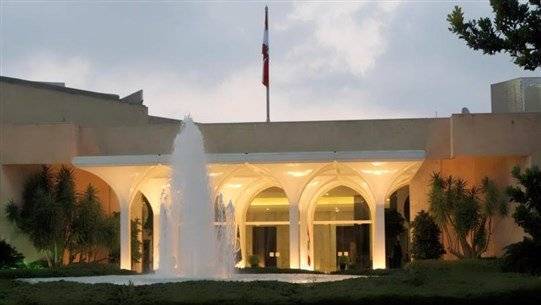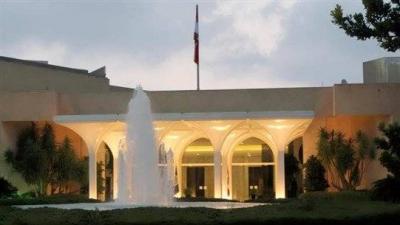The constitutional deadline for electing a new president of the country to succeed President Michel Aoun, whose term ends on October 31, begins on Thursday, September 1. This comes amidst a bleak outlook for the parliament's ability to complete this obligation before Aoun leaves the presidential palace, placing the country in dire scenarios; particularly since some fear a repeat of the 1989 experience when Aoun, who led a military government, refused to recognize the Taif Agreement and declined to leave the "People's Palace," handing over power to the elected president René Moawad, as he also refused to transfer authority to President Elias Hrawi.
As the time until the presidential election dwindles, there is a keen anticipation of how the parliamentary blocs affiliated with the ruling parties will deal with pressing and difficult obligations, primarily the formation of a constitutional government that would assume the responsibilities of the president in the event Lebanon faces a presidential vacuum, instead of a caretaker government. This is particularly true since the visits of the designated prime minister to form the government, Najib Mikati, to Baabda Palace have been unproductive due to his inability to convince Aoun with the governmental formulas he proposed, which were firmly rejected by his son-in-law, MP Gebran Bassil.
Former minister Rashid Derbas, who has been following Mikati's contacts and consultations, believes that the atmosphere "does not suggest the possibility of forming a government before the end of President Michel Aoun's term." He stated in an interview with Asharq al-Awsat that "all the positives that the designated president built in the last hours were dissipated by the president's team," considering that "the insistence of a political party on obstructing the formation of the government aims at two things; the first is to create a pretext to say that the caretaker government is illegal and cannot govern the country, and the second is to invent a constitutional fatwa that leads to withdrawing the mandate from Mikati and allowing Aoun to remain in the presidential palace."
He emphasized that "proposing to withdraw the mandate is futile; the president only transmits the will of the parliament to the designated president as a result of binding consultations, and he is not the creator of it; thus he has no authority to withdraw the mandate or appoint a substitute for Mikati." Despite Aoun's visitors relaying his recent confirmation that he would not remain in the presidential palace for a single hour after his term ends, sources close to the Free Patriotic Movement have resumed disseminating information about constitutional fatwas that would enable Aoun to continue in his role, under the pretext that the caretaker government does not have the authority to take over his powers by proxy.
However, Derbas insisted that "Aoun's remaining in his position means occupying the presidential palace without legal justification, and any decree he signs would be of no use and cannot be published in the official gazette or implemented." He characterized the campaign waged by head of the Free Patriotic Movement Gebran Bassil against Mikati as a context of "one sect overpowering another, under the pretext of achieving an illusory victory for Christians, which constitutes the height of undermining the state's structure." Derbas concluded by saying: "These individuals care about remaining in power even if the cost is the destruction of the country."
Aoun's close associates argue that presidential powers transfer to the Council of Ministers as a whole, claiming that a caretaker government constitutionally cannot convene a cabinet meeting to make decisions. However, Derbas reminded that "the theory of managing public utilities takes precedence over anything else," pointing out that "the cabinet can meet during a state of utmost necessity even under a caretaker government."
The variety of constitutional interpretations does not mean they are applicable, given the clear texts of the Lebanese constitution. Therefore, legal expert and constitutional lawyer Saeed Malik called for respecting the obligations and rapidly forming a new government that gains the confidence of the Lebanese parliament, followed by electing a new president who takes office on November 1. He noted that these two matters would spare the country significant conflicts.
Malik stated in an interview with Asharq al-Awsat: "If it is not possible to elect a president for the republic, Article 62 of the constitution explicitly states that the government, even if it is a caretaker government, assumes the powers of the president by proxy until a president is elected." He clarified the president's powers divided into three sections: personal powers, powers related to his position, and those concerning managing the country and running institutional affairs. Here, the government's role is limited to managing the public administration and issuing decrees, publishing them in the official gazette, and signing laws approved by the parliament, emphasizing that "the personal authority is related to the person of the president; only he has the right to send a message to the parliament, challenge laws he opposes before the constitutional council, and propose items outside the council's agenda."
Concerns continue to grow over the potential for Aoun to remain in Baabda Palace, linked to remarks made weeks ago by MP Jamil al-Sayyed, who stated that the president would not hand over the country to a vacuum. However, lawyer Malik considered that "President Aoun's departure on October 31 is a binding constitutional decision for him, not an option he can accept or reject." Concerning the possibility of forming a military government, similar to what former president Amin Gemayel did in 1988, when he established a military government headed by Aoun himself, constitutional expert Saeed Malik confirmed that "before the Taif Agreement, the president appointed ministers and designated someone as prime minister, but after the Taif and the establishment of a new constitution, a government can only be formed when both the president and the prime minister sign the decrees together and gain the confidence of the parliament."
Some entertain the hypothesis that Aoun may declare a state of emergency, shifting authority to the military, thus rendering the caretaker government useless. Lawyer Malik responded to this theory by asserting that "a state of emergency requires conditions that are currently unavailable, the first being an unstable security situation." He said: "Even if we hypothetically accepted that, declaring a state of emergency requires three conditions: First, convening the council of ministers, which is the one to declare the state of emergency; second, only Prime Minister Mikati can call the cabinet to meet; and third, a state of emergency needs two-thirds of the ministers' votes, which is unattainable at this time." Malik confirmed that "the emergency law requires the parliament to convene within eight days of declaring a state of emergency to take a position on it, and all these scenarios are impossible at present."




